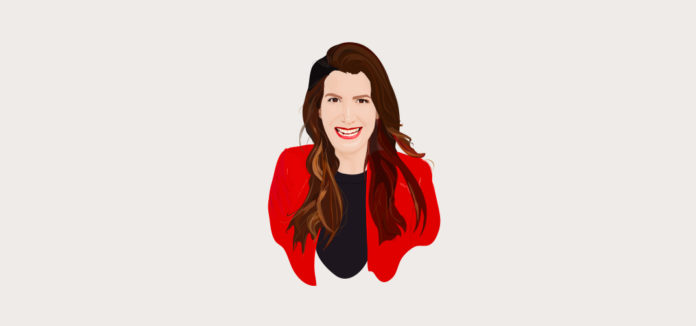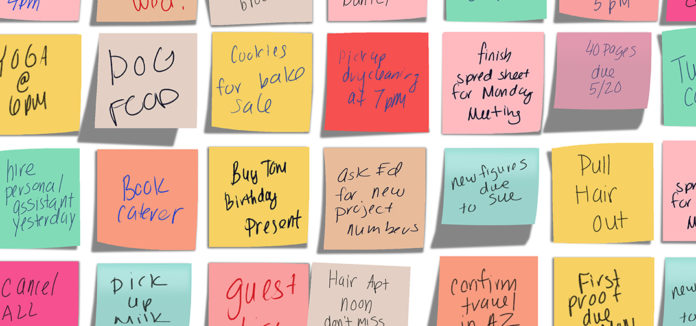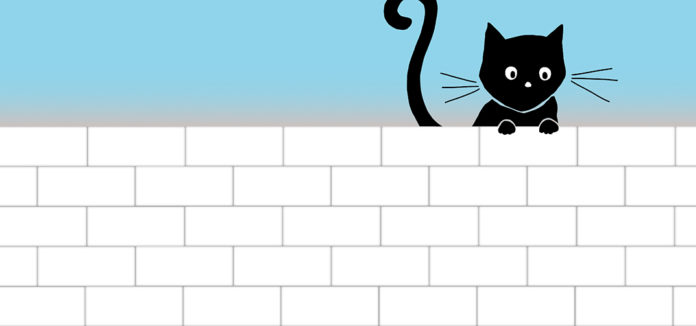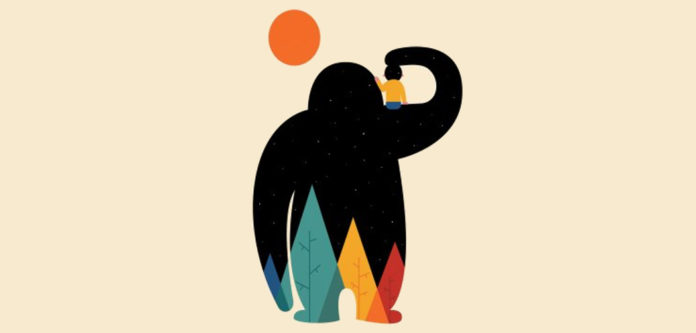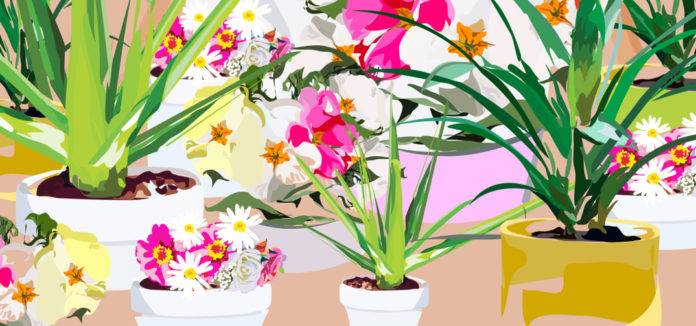Tina Sharkey is the Co-Founder & Co-Chair of Brandless, a company that makes a curated assortment of high-quality things for you, your home, and your family in support of a life well-lived life.
How to Tackle Your Daily To-Do List
Take advantage of research suggesting that willpower is greatest in the morning and do the things that require self-discipline, like going to the gym or doing your taxes, early in the day. Along these lines, plan ahead. There are plenty of things you can do to help you feel less out of control: Choose your outfit the night before. Always keep your keys and cell phone in the same place. If you want to run in the morning, place your sneakers and running clothes by your bed. If you want to spend more quality time with your kids, plan it. Unless it is on your schedule, it might fall by the wayside.
“The only reason for time is so that everything doesn’t happen at once” is a quip attributed to Einstein. But these days, everything seems to happen at once. The good news is that when we feel less conflicted, we restore our sense of time.
This article originally appeared in the September 2018 issue of Marie Claire Magazine.
I wish you all the best,
Dr. Samantha Boardman
Is Curiosity The Key To A Fulfilling Life?
We are born curious. From birth, babies want to explore their surroundings. The entire industry of baby proofing grows out of an inborn need to touch, see, taste and experience the world around them. As a child’s senses and capabilities develop, their sense of wonder expands too. They venture into the unknown with great interest and an unbridled desire to know and understand more.
But as adults, many of us lose this sense of discovery. We get so busy looking for answers, we forget to ask questions. Out of fear of the unknown or because we don’t want to disrupt the routine or because we are just too busy dealing with our daily lives, curiosity takes a back seat. Playing it safe prevents us from being overwhelmed and creates a predictable and understandable environment but it doesn’t foster the discovery of new things or build the skills of resilience that novel challenges teach us.
By avoiding situations that provoke anxiety, we may be protecting ourselves from discomfort, but we are also missing out on a key aspect of vitality: the joy of learning something new. According to a Gallup survey, learning something new was one of the strongest influences on how much enjoyment a person experienced on a given day.
What is the best way to keep curiosity alive? Make it a habit to ask more questions in your daily life. Two of my favorites are inspired by a speech given by James Ryan, Dean of Harvard’s Graduate School of Education:
(1) Wait, what? When you ask this question, you are expressing interest and a desire to learn more. This question is essential for understanding and clarification. It’s about pressing pause and taking the time to carefully consider what you are doing before making up your mind.
(2) I wonder if/why… This form of inquiry keeps you curious about why things are as they are and exploring different possibilities and scenarios. It enables you to think differently and see a problem with fresh eyes.
The best questions help us rethink what we already know and not to take “what is” for granted. As the old saying goes, “millions saw the apple fall, but Newton asked why.”
This article originally appeared in the June 2019 issue of Marie Claire Magazine.
I wish you all the best,
Dr. Samantha Boardman
Dr. Peggy Drexler: An Expert Dishes on Daddy’s Girls, Momma’s Boys & More
For Father’s Day, Dr. Peggy Drexler, author of Our Fathers, Ourselves and Raising Boys without Men, speaks to the role — and how it’s changing — men and dads play in our lives. The assistant professor of psychology at Weill Medical College of Cornell University is currently working on her next book about women.
Plants, Positivity & Performance
Luther Burbank (1849-1926), the famous botanist and creator of more than 800 new varieties of plants, once said:
Flowers always make people better, happier, and more helpful; they are sunshine, food and medicine for the soul.
Surely receiving flowers is enough to brighten anyone’s day but as Burbank appreciated, they do so much more. A slew of new studies demonstrate the positive impact plants have on mental and physical health:
Mood Boosting
Studies show that indoor plants enhance mood and creativity and the positive effect lasts for days.
Heath Improving
Patients recovering from surgery in a hospital room decorated with plants and flowers had lower blood pressure, felt less fatigued and required less pain medication. Employees take fewer sick days if they work in offices with plants. Fatigue, headaches, sore throats, coughs and dry skin were all reduced in plant rich indoor environments.
Stress Reducing
Plants and flowers have been shown to reduce stress and lower blood pressure in as quickly as five minutes. They help people feel relaxed and content. Taking care of plants enables people to cope with negative feelings and loneliness.
Productivity Increasing
Enriching an office space with plants boosts productivity by as much as 15%. “Green” office spaces can increase employee happiness and the bottom line. They also convey the important message that the employer cares about the environment and the wellbeing of the employees.
Restaurant Liking
The presence of fresh flowers on a table has a positive effect on a diner’s experience and increases the likelihood they will return. Guests feel welcome and well taken care of in a room adorned with flowers.
Relationship Building
Plants and flowers create a welcoming atmosphere and bring people together. The presence of flowers in a room has been shown to lead to increased contact with family and friends and to build empathy.
Concentration Enhancing
Plants can increase focus. People report feeling more attentive in an environment with some greenery. Children who spend time around plants learn and retain information better.
Sales Soaring
Plants have a positive effect on perception and value. The Opryland Hotel in Nashville has an 85 percent occupancy rate — a high number by hotel standards where the average is 64 percent. According to a case study, the main factor accounting for this high occupancy rate is the large investment in flowers and plants.
Monet said it best:
I must have flowers, always, and always.
I wish you all the best,
Dr. Samantha Boardman
My Thoughts On Being a Mom
I am so happy to be included in “Mother and Child,” by Claiborne Swanson Frank. She has the patience of a saint and the unbridled joy of Mary Poppins. Miraculously, Claiborne managed to convince my reluctant and photo averse children to cooperate. By the end, they didn’t want her to leave. A few days later, Claiborne sent me a list of questions that really got me thinking. Here is what I came up with.
How do you honor the spirit of your child?
Accepting them as they are rather than trying to mold them into something I want them to be. As writer and psychologist Dr. Andrew Solomon writes in Far From the Tree, “We cannot help but be proud of how different we are from our parents but cannot help but be a little bit sad by how different our children are from us.” I remind myself to make peace with this on a daily basis.
What lessons have your children taught you?
My children have taught me about the value of play and creativity in our lives. While I am certainly not the next Jeff Koons and have limited artistic ability, thanks to my children, I have rediscovered how much fun it is to make and create things. And even when they don’t turn out well—and they often don’t– the joy is in the doing.
How do you describe your personal style of mothering?
I have learned that it is better to spend more time with my children and less time on them. Instead of feeling the pressure to schedule lot of after-school activities and classes, I prioritize downtime and free-time for play.
How do you prioritize your self-care and the cultivation of passions while balancing obligations, responsibilities and family?
For me, the notion of balance is a myth. Having a full life and wearing many hats, by definition, unbalances me. I think of that as a good thing. I do many different things with and for many different people. It’s a privilege, not a burden.
What morals and values do you hope your children embody?
Kindness, courage, compassion and curiosity. To value goodness over greatness.
If you had one lesson to teach your children what would it be?
To have an open mind and a humble spirit.
How would you describe your partner’s best strength as a parent?
Humor. My husband has an uncanny ability to defang a stressful moment by making me laugh.
Who do you rely on? Your mother, aunt, sisters, mother-in- law, or caregiver?
There are those who would have us believe that we should “go it alone” and not to rely on others. I disagree. It takes a village. I am grateful for the support of everyone in my life.
What is the role of your mother in your life now?
While we don’t live in the same city, my mother is a constant presence in my life. Whenever I have a question about something or am in doubt about a decision, I either call her up or ask myself, “What would Mummy do at this moment?” She has excellent judgement and perspective and always takes the high road. I try to channel her dignity whenever I can.
What is the role of your mother in your child’s life?
My children absolutely adore my mother. She is full of energy and takes them on adventures whitewater rafting and mountain biking. Yes, she makes sure they sit up straight and know how to use a knife and fork, but she is also the one sneaking them Gummi Bears before lunch!
What was the best advice your mother gave you?
“Go and make yourself useful” My mother used to say this all the time when I was a child. She would whip it out whenever she suspected my sister or I were not making use of our time or up to no good. She was especially fond of using it in the summer. Whenever we dared to complain that there was nothing to do on a hot afternoon, we knew what she would say. And she meant it. Making ourselves useful meant weeding the garden, sweeping the gravel, cleaning the garage, picking rocks out of the drain, washing the car or doing something, anything that would shake us out of self-absorption.
As much as I didn’t enjoy weeding the garden, it was gratifying. It was tedious but also purposeful. Those weeds would grow back but making a tiny difference in that moment felt good.
That’s the awesome thing about being useful—when you contribute to something beyond yourself, no matter how insignificant it may seem, you forget yourself and all the little things that are bugging you.
Get your copy of Mother and Child by Claiborne Swanson Frank.
Photo Credit: © Claiborne Swanson Frank

